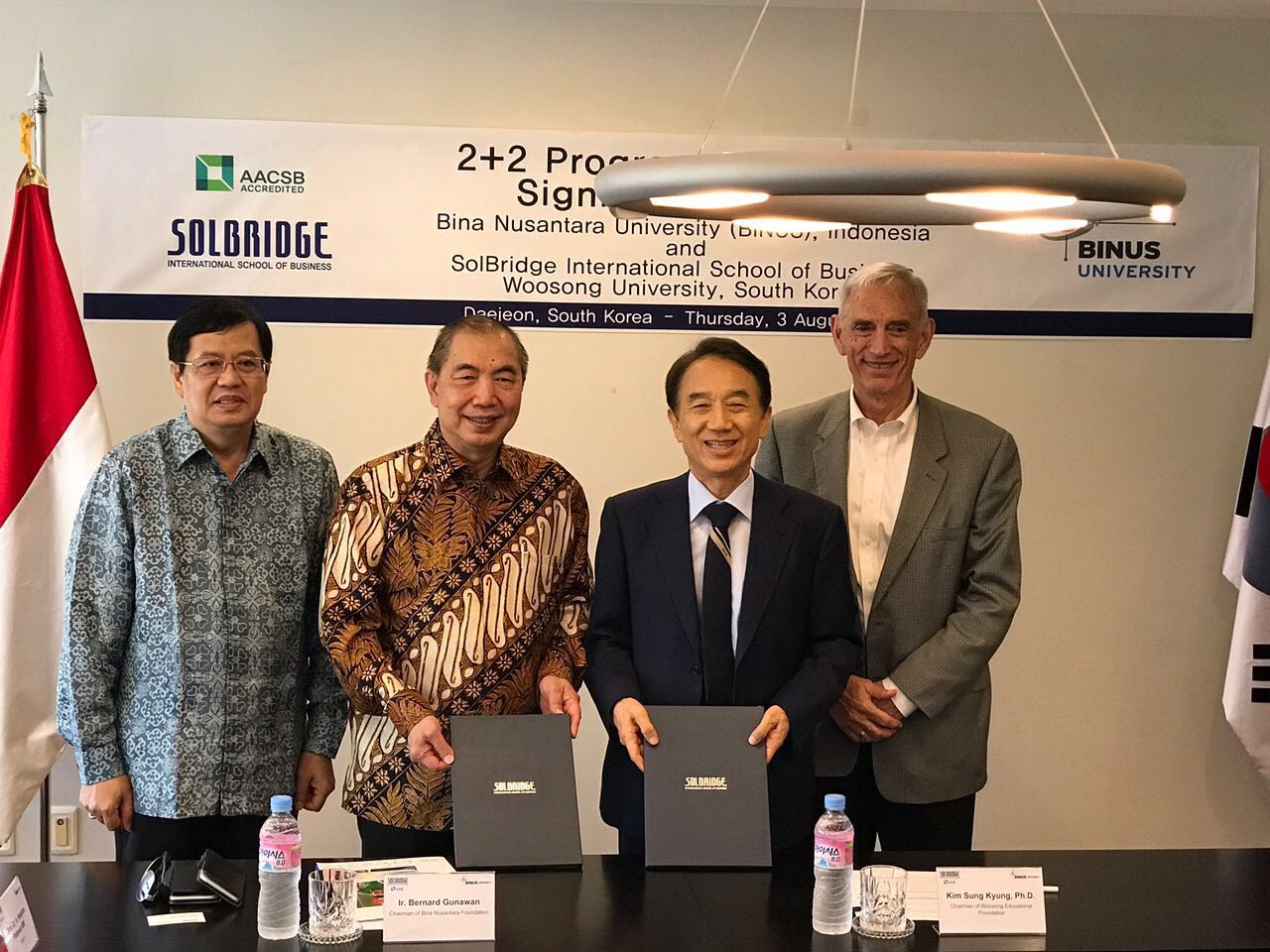Speech of Mr. Bernard Gunawan in BINUS – SOLBRIDGE 2+2 MOU Signing


Distinguished guests,
- Kim Sung Yung, PhD – Chairman of Woosong Educational Foundation
- Kim Taehan – Deputy Director of International Relations & Director of Administration
- Iskandar Yuldashev – Associate Director of International Relations
- Rezia Usman – Senior Regional Manager of International Relations
- Dr. Ir. Harjanto Prabowo – Rector of BINUS UNIVERSITY
- Stephen Wahyudi Santoso – President of BINUS HIGHER Education
- Firdaus Alamsjah, D – Executive Dean of BINUS INTERNATIONAL
- Judi Arto, Marketing Director
- Solbridge & BINUSIAN leaders, and educators
- Ladies and gentlemen, good afternoon
In May 2017, President Joko Widodo received the honorary visit of the Special Representative of the President of the Republic of Korea for ASEAN at the Presidential Palace of Bogor, West Java.
The President said, “The Republic of Korea is a strategic and important partner for Indonesia as it plays an important role in the region. Cooperation in various economic sectors and industries between the two countries is very intensive.” President Jokowi added that trade and investment volumes between the two countries have steadily grown significantly.
Korean business in Indonesia has penetrated various business lines ranging from retail, telecommunications, automotive, food and beverage to education. South Korea is the third largest investor in Indonesia over the past year, not only in the real sector, but also in the banking and education sectors.
Indonesia has the potential to further strengthen cooperation with South Korea, especially in the field of education. We also see that education in South Korea has advanced rapidly, especially in the field of applied technology mastery that impacts businesses globally.
There are about 1,200 Indonesian students in South Korea, while Indonesia’s workforce in South Korea has reached more than 30,000. There are also about 250 professional workers, business lawyers, and construction service providers.
In Indonesia, there are more than 2,500 Korean companies. Over 30,000 Koreans live in the country. To respond to these developments, it is certainly necessary for the educated workforce to face the increasingly competitive global labor market.
BINUS University is dedicated to building a strong Indonesia engaged in the region and on the global stage. To prepare our students to lead Indonesia in this role, we have to build regional knowledge and facilitate an exchange of ideas. At BINUS, we do this by building an environment facilitative of international experience.
All BINUS students should graduate with international experience initiated not only through activities on our campuses but also through international mobility.
Every year, more than 7,000 BINUS students gain international experience. A very important aspect of preparing our graduates to lead Indonesia in its international engagement is our exchange program. We partner with over 130 leading universities worldwide and we are a member of ASEAN International Mobility for Students (AIMS), International Student Exchange Program (ISEP) and Passage to ASEAN (P2A).
The Republic of Korea is an important partner for us in this respect. We have an active collaboration with 20 universities in South Korea. The country is the favorite study abroad destination of our students. In 2017 alone, we expect some 90 BINUS students to study in one of our partner universities in South Korea. As part of this partnership, a growing number of students from South Korea also study in BINUS every year.
Strong educational ties between countries build strong international relations.
Studying and working together create an understanding of different perspectives. In the case of Indonesia and South Korea, our students learn more about the two nations, and bring home with them not just knowledge and skills but also lasting friendships.
Thank you, Your Excellency. I am happy to see our countries develop not just in terms of trade, but also in terms of educational partnerships and friendly relations. I am especially happy to see student, faculty, and higher education staff exchanges between our countries.
I am convinced that this will benefit education and research for a stronger Asia.
Thank you.
